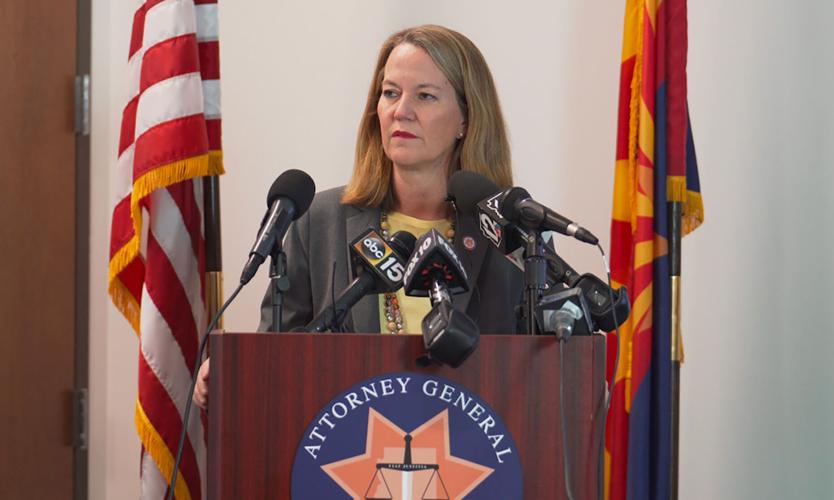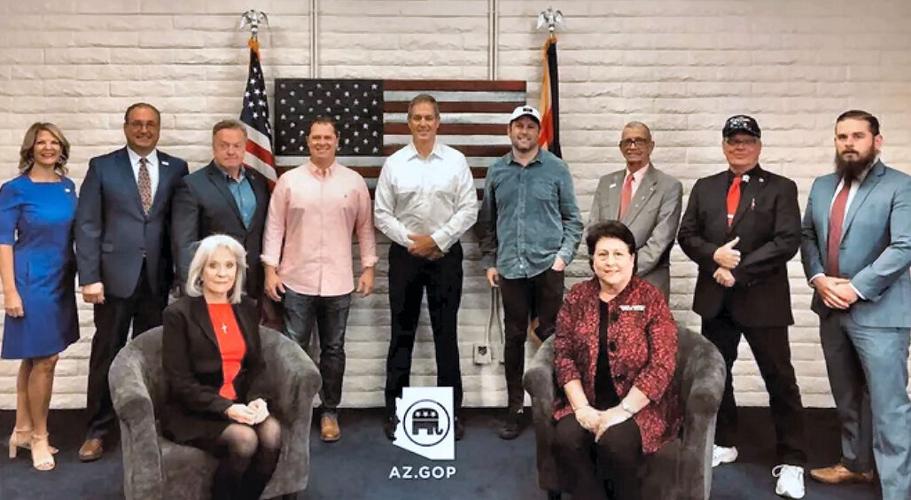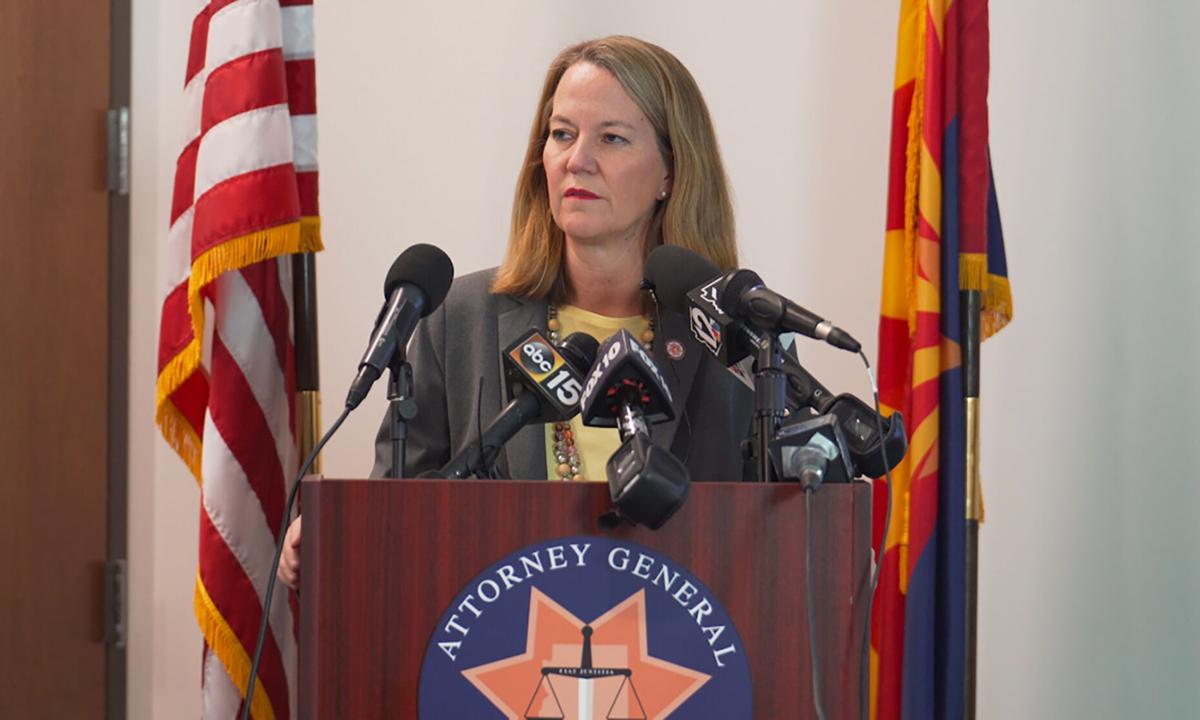PHOENIX — The state grand jury indicted the 11 Republicans who submitted their names in 2020 as the true electors for Arizona and falsely claimed Donald Trump won the state.
They are charged with conspiracy and forgery in connection with documents that declared Trump won the popular vote in Arizona that year. In fact, he lost to Democrat Joe Biden by 10,457 votes.
Arizona indicts 18 in case over 2020 election in Arizona, including Giuliani and Meadows
They also are charged with conducting fraudulent schemes and practices.
The document also says some others were indicted but have not been named because they have not been served with the court papers. It identifies some by their roles in the Trump campaign. That makes it possible to identify two of them as Rudy Giuliani, an attorney for the former president, and Mark Meadows, who was Trump’s chief of staff.
The indictment also names Trump himself as an “unindicted co-conspirator.’’
There is no question but that the 11 indicted Arizonans signed documents declaring themselves the official electors. They also sent that statement to the National Archives to falsely declare Trump was entitled to Arizona’s 11 electoral votes.
But it has been an open question whether those acts rose to criminal activity. Some had said the plan was simply to present a backup slate to be read should litigation show Trump actually won the vote here.
That argument did not wash with prosecutors in Georgia, Nevada and Michigan, where “fake electors” have also been indicted. Prosecutors there said the alternative slates were part of a scheme hatched in the White House by those close to Trump to convince Vice President Mike Pence to refuse to accept the official results reported by Arizona and other states. The goal, according to indictments in those other states, was to prevent Biden from getting the necessary 270 electoral votes.

This 2020 photo from the Arizona Republican Party shows the 11 GOP electors posing for a group photo after they signed documents claiming the state’s electoral votes should go to Donald Trump.
Arizona’s Democratic Attorney General Kris Mayes said her investigators “took the necessary time to piece together the details of the events that began nearly four years ago.’’
“They followed the facts where they led,’’ she said in a written statement late Wednesday announcing the indictments.
While the Arizona indictment specifically names the 11 electors, there are seven others who are not currently identified. But indictments in other states have named aides and attorneys to Trump for their roles in crafting and executing the scheme.
“Justice demands an answer to the efforts that the defendants and other unindicted co-conspirators allegedly took to undermine the will of Arizona’s voters during the 2020 presidential election,’’ Mayes said.
That election, she said, was run “free and fair,’’ with voters choosing Biden.
“Unwilling to accept that fact, the defendants charged by the state grand jury allegedly schemed to prevent the lawful transfer of the presidency,’’ Mayes said.
She said the reason they did it is irrelevant.
“Whatever their reasoning was, the plot to violate the law must be answered for,’’ Mayes said.
“The scheme, had it succeeded, would have deprived Arizona’s voters of their right to have their votes counted for their chosen president,’’ she said. “It effectively would have made their right to vote meaningless.’’
Mayes said the scheme was based on false claims of widespread voter fraud. The only reason the effort failed is because members of Congress ignored it, she said.
Aside from the acts of the electors in submitting the false certification, the indictment also says that someone — identified as “the Mayor’’ — spread false claims of election fraud, including at a “hearing’’ he conducted in Phoenix less than a month after the 2020 election. That was Giuliani, the former New York City mayor.
At that time, the indictment says, he falsely claimed that Arizona election officials “have made no effort to find out’’ if the results of the presidential race were accurate.
There also were efforts — including calls from the White House — to induce Republican Rusty Bowers, who was the Arizona House speaker at the time, to investigate the election returns. Bowers refused, saying there was no evidence the results were inaccurate.
The indictment also includes Meadows. It says he worked with members of the Trump campaign to coordinate and implement the false Republican electors’ votes in Arizona and six other states.
Others who could be identified from the Arizona indictment based on the roles it says they had are Jenna Ellis, John Eastman and Christina Bobb, all also attorneys for Trump, as well as campaign adviser Boris Epshteyn and former campaign aide Mike Roman.
The 11 Arizonans charged are:
Kelli Ward, who at the time was chair of the Arizona Republican Party; Michael Ward, her husband; Tyler Bowyer, an executive with Turning Point USA, which promotes conservative politics on campuses; Jake Hoffman, a state senator; Anthony Kern, also a state senator and now running for Congress; Robert Montgomery of the Cochise County Republican Committee; Samuel Moorhead of the Gila County Republican Committee; Greg Safsten. former executive director of the Arizona Republican Party; Jim Lamon, a failed candidate for U.S. Senate; Nancy Cottle, who was chair of the Trump electors; and Loraine Pellegrino; secretary of the Trump electors.
Hoffman, in a prepared statement, said Mayes already had decided that the electors were guilty of a crime, "that it was her job to get Biden reelected, and that she would control the timing of the indictment.''
He said the attorney general has "weaponized'' her office, and accused her of delaying the process — other states brought indictments earlier — to affect the July primary elections.
Kern also denied he did anything wrong in signing the statement as an elector.
The indictment says there was plenty of evidence before the fake electors submitted their documents on Dec. 14, 2020, that there was no basis for any claim the election results were wrong.
A lawsuit was filed in Maricopa County Superior Court the day after the election based on complaints about electronic ballot counting from two voters. It was dismissed.
The Trump campaign filed its own claims. They were dismissed based on the conclusion that even if the claims raised were true, they would not have changed the election outcome.
Also dismissed was a lawsuit filed by Kelli Ward against all 11 legitimate Democratic Party electors. A judge dismissed it after finding "no misconduct, no fraud, and no effect on the outcome of the election.''
Finally, there was a lawsuit filed by the GOP electors in federal court, where the judge found its claims reached "implausible conclusions, often because they are derived from wholly unreliable sources.''
Senate leaders Mitch McConnell and Chuck Schumer found themselves on the same side of the issue as the upper chamber began debate on objections to the Electoral College vote that is unfolding in Congress Wednesday.






